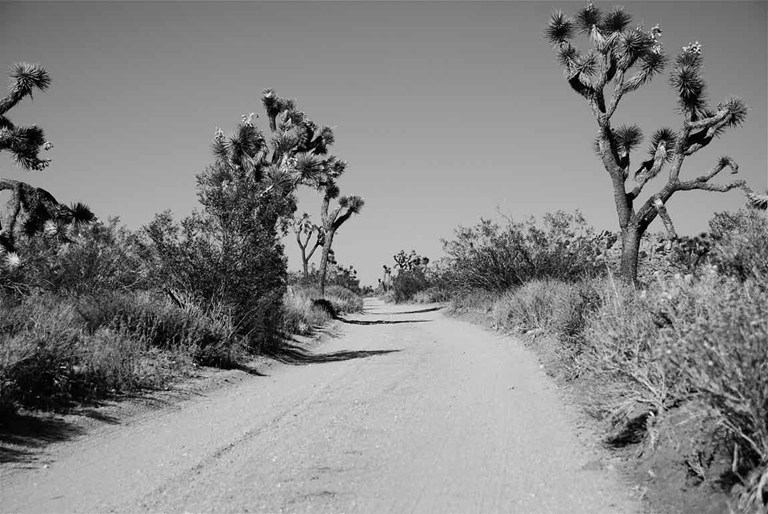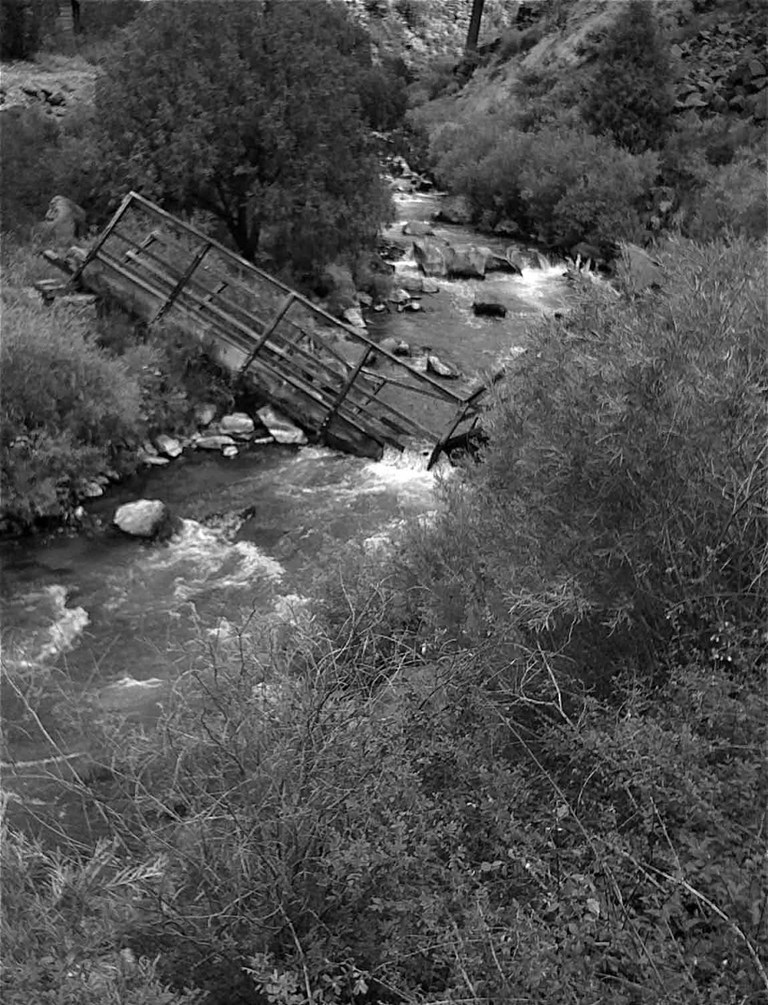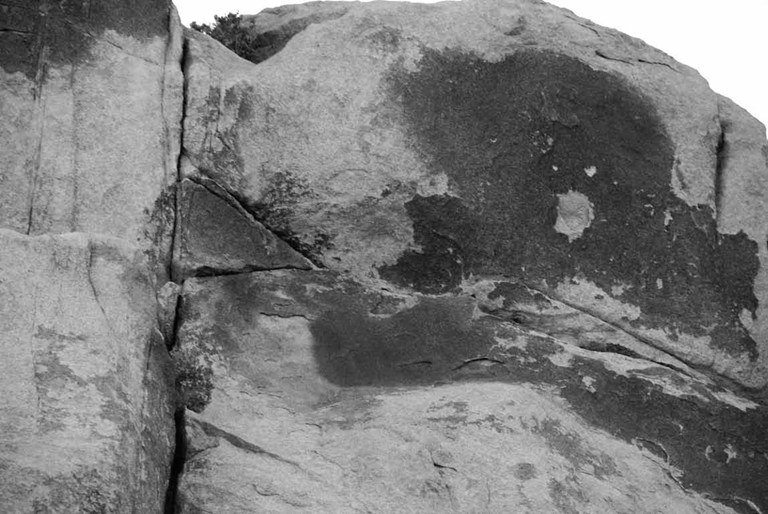Percival Everett by Virgil Russell (16 page)
Read Percival Everett by Virgil Russell Online
Authors: Percival Everett

This is a picture of the road that I find myself walking along now. You will note the trees and perhaps you will recognize them and so imagine you know where I am, but you would be wrong. It’s okay to be wrong. I used to think that everything was about exposing nonsense in the world. How did that asshole Wittgenstein put it? To move from disguised nonsense to patent nonsense? Well, turns out that’s bullshit. I thought for a while that we were supposed to make sense out of nonsense and then I thought that we were supposed to try to turn sense into nonsense and now I know that we’re supposed to make sense that sounds like nonsense and then call the sense nonsensical. That’s what I think now. I’ve had a long life of thinking, if not nonsensical things, then particularly useless and annoying things. Like this.
When young I would climb word ladders. Word ladders would get me from
rest
to
trot,
from
hate
to
love. Hate, hale, have, lave, love.
And therefore I can get from
hate
to
live.
But here’s the thing.
Live
is
evil
spelled backward, but
evil
cannot be changed into any other word. Same is true of
devil.
What’s that all about? I start my fucking ladder with
evil
and I can’t get a single step up. I’m just saying.
God
I can turn into
sod, pod, hod,
and even
cod. Good
becomes
food
rather nicely. But
evil.
You wonder why I wonder. Well, I just do. I’m in a fucking coma. How evil is that?
Pretty evil.
My taking notice of this rather odd fact is not a product of my having been freed from the church. As you know, better than anyone, I was never a participant in the spiritual arts. To their credit I doubt they would ever have let me.
This I’ll take on faith.
Not bad. I mention this because often when emancipated from the religious handcuffs, people don’t go trotting off to rational thought.
No?
No. They embrace every bit of insipid spiritual and psychic nonsense they can find. Crystals and the Cabala and new age voodoo creams and what have you. I guess it’s the nature of human beings. People need something to explain the big bad world out there. Not knowing is not acceptable. Now, I’m going to say something profound. Just giving you a bit of warning. I don’t want it to be missed. It’s only when we can accept our cluelessness about the world that we can approach the manifestation of the inexhaustibility of ignorance and that is art. Did you write that down? Don’t bother. If it turns out to be true then it will only negate what I’m trying to say.
No doubt.
Listen, I’ve spent my whole life trying to make something I don’t understand. Now, I’m just trying to make a good coma. And
coma
spelled backward is
amoc,
which doesn’t mean a damn thing.
When my son was quite young, he loved dirt roads. We would be driving through northern Virginia, maybe to visit nurseries looking for roses, maybe just driving to enjoy the autumn foliage, but when he saw a dirt lane, he would sit up and bark, Dirt road, dirt road. Often I would take it and he squealed with delight as the ruts and rocks bounced our station wagon wildly. Perhaps my fears were a bit stale, remnants, but I was always worried that we might come upon a Klan rally or some other miscreant activity. One night we did. It was dusk, the hour when things become indistinct. A magic hour in one’s yard, but not so when one was black and in America’s yard. It didn’t even seem like fire at first and the moving figures didn’t really appear as men. They didn’t make me think of ghosts or even of anything that should not have been in woods, but they were there and they were men and they were clad in white sheets and they did have pointy heads and bad intentions. Dusk turned abruptly to night and the only lights were from car headlights behind us, car taillights in front of us, and the waving of flashlights and lanterns to our sides. The cross was a fire and I suppose it should have been. The pointy heads were stopping cars, shining lights into faces and peeking into backseats. I know my son did not see me reach under the seat to get it, but he saw it quickly enough, my .32-caliber revolver in my lap, between my legs, what so many black men kept under their seats for such occasions. When our turn at the checkpoint came, I stepped on the gas and we fishtailed away. We were not chased. The familiar dirt lane led us back to the main highway, I stuck the pistol back in its home, and we said nothing, father and son, quietly sharing America. But it could have happened differently, leaving you a bit of business to tend to, deal with, sort out. When I stepped on the gas, I slammed into the baby-blue Chevy pickup that had started across the road. We lurched forward, your ten-year-old arms catching you against the dash, my chest thrown into the steering wheel, sounding the horn, and all of a sudden we were in a world that was like a book with no pictures or conversation. Pointy heads moved into our car, grabbed me, and left you to scramble your way out behind. You were pushed aside and not gently, mind you, by a woman in a sheet, a fat woman who smelled of butter and dusty upholstery. There were voices, many voices, that all sounded alike, but were so distinct that later each one would come to you in turn, in dreams, nightmares. You crawled and then found your feet and followed as the men laughed while they dragged me toward the burning cross, the gasoline fumes apparently reluctant to burn off. You watched while I said nothing but told you with my eyes to run, to run fast away. A white boy, wild eyed and full of madness, came and stood beside you and you studied him like he was from another planet, another species, and you knew even then that you were right. A man burned me with his cigarette around my neck, made a ring around my neck. You tried to find the stench of your father’s burning flesh in the air but found only the gasoline and now the sour breath of the boy beside you, his mouth crazily wide open. And then there was dead silence as a rope was brought out, a sacred and cherished rope that appeared already stained with blood. A noose was placed over my head and around my neck and you looked at my eyes and I told you again to run, run away fast, but you did not. You stood stunned. You were staring at me. Ain’t you gonna say anything, nigger? I did not speak but kept silent. Such silence keeping required that I had something to say.
There was a Young Lady of Parma,
I thought,
Whose conduct grew calmer and calmer; When they said, Are you dumb? She merely said, Hum! That provoking your Lady of Parma.
And I smiled a half smile and you understood then to run and you did. I watched your little legs carry you quickly through the distracted herd. They put the rope in a tree, a tree that sank its roots deep into everywhere, deep into yesterday, deep into my blood and theirs. It was a big sycamore and so I knew there must be water someplace and I hoped it would not impede your progress to the main road; then I remembered the culvert that allowed the stream to pass under the road and I sighed some relief as the rope tightened around my neck and my trousers were pulled down to around my ankles. The main road was just a two-lane blacktop and in later years you would drive past the dirt road that would be visible but not accessible and tell your children that that was where their grandfather had been hanged, not telling them the part about his testicles being cut from his body by a serrated but edgeless hunting knife, a fitting metaphor for the miscreants perpetrating the act. That I then, you then, I now, could imagine such hell was hell enough. This is not a play with counterfactuals, it is not a play with parallel dimensions, it is a cucumber of a man lying voiceless in a bed of ball bearings trying to find a Virgil so I can fire him and tell him to go to hell. Because, I say this in complete half seriousness, things are not as elementary as they appear, a pretext is never more than a pre-text. You know where I am and I know where you are, the cat’s in the kitchen the cow’s in the car, the dog said he won’t be here by five, but he’s never seen a cattle drive.
I ran. In the milky faces I saw the soldiers of My Lai, wide-eyed violent lust-burning gazes, their mouths agape and gap toothed, their voice high registered and pig-squealing with perverted delight, hardly animal but all too certainly human. I ran and I ran along that dirt and gravel lane but turned off, afraid that I would be too easily seen in the twilight, the unfolding moonlit night, my white high-top Converse sneakers promising to give me away. So I cut into the inky woods where I made much noise breaking sticks and brush and being slapped by low branches, but my noise was so much less than their beastly moaning that it hardly mattered. I could see my father’s expressionless face telling me to run. I wasn’t sure I was being chased, to this day I do not know if those red legs, those rednecked inbred bastards, actually chased me into the night. I remember the hooting of owls, especially when I came to a broken-down footbridge, the water racing over its collapsed middle. I used the structure to support myself as I splashed through the chilly water.

I made my way up a steep embankment to the shadowy blacktop, a stretching, sable ribbon twisting through the darkness, and I ran, not choosing a direction; the direction chose me. A pickup truck caught me in its yellowed headlights and skidded to a stop. I was too tired to run any farther and so remained there, bathed in the sick glow, my hands trembling on my soaked denim knees, my chest heaving. It was not until I saw that the driver was a black man that I started quietly crying, for so many reasons. He approached me cautiously, turned sideways like a crab. I tried hard to say something but could not make a sound. He told me to slow down, called me son and I didn’t like that, tried to put a hand on my back. I moved away from his touch. I told him that they were going to kill my father, that they were killing him. I said KKK and he scooped me up in his arms, shoved me into the cab of his truck, and drove off in the opposite direction. I recall that the cab of that truck stank of turpentine and that there was no door on the glove compartment.
The stories we could have told. Give me your evidence. Shant, said the cook. And here we are, supine, what a lovely word, like the name of a flower, look at the supines in the meadow, a sad vision actual, a virtual vegetable garden, and we cucumbers among them, in our proper rows. You can be Murphy this time. I’ll be you.

Do you see what I see? Turn about and wheel about, and do just so. But all that disappears into the water that is behind us and in the desert that lies ahead. None of what mattered matters and it will not matter if the matter matters, no matter what, as a matter of fact. A lie we would do well to believe. But here I am, me again, head propped up, sort of, at a seventeen-degree angle, the bright overhead lights offering no bother. I could be writing you could be writing me could be writing you. I am a comatose old man writing here now and again what my dead or living son might write if he wrote or I am a dead or living son writing what my dying father might write for me to have written. I am a performative utterance. I carry the illocutionary ax. But imagine anyway that it is as simple as this: I lay dying. My skin used to be darker. Now, I am sallow, wan, icteric. I am not quite bloodless, but that is coming. I can hear the whistle on the tracks. I can also hear screaming, but it is no one I know. So, fuck them.